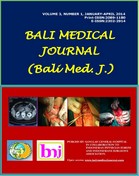HIGH BLOOD LEVELS PROCALCITONIN AS SYSTEMIC IMFLAMATORY RESPONSE SYNDROME PREDICTOR IN SEVERE AND MODERATE HEAD INJURY
Abstract
Background
Numerous studies have shown that procalcitonin (PCT) was not related to degree of trauma. High PCT serum levels have been found in patients with bacterial or fungal infection and also in acute phase of trauma. Currently, there has been no research discussed about changes in serum levels of PCT in particular head injuries and severe head injuries. Moderate and severe head injuries were common trauma cases in Emergency Room (ER) and had high mortality rate. Based on Glasgow Coma Scale (GCS), moderate and severe head injuries were scored between 3 and 13. This research aim to determine whether high blood levels PCT can be used as a predictor of the occurrence of SIRS. Method: A cohort prospective study was applied in this research to determine high blood levels of PCT as a predictor for SIRS in moderate and severe head injury. This study was conducted from June 2013 - August 2013 at Sanglah General Hospital with 40 research subjects. Data was presented in tables and analyzed with Chi Square test at 95% CI and p <0.05% was considered significant. Results: From the 40 samples, there were 34 males (85%) and 6 females (15%), 18 samples (45%) had moderate head injury and 22 samples (65%) had severe head injury. One sample (2.5 %) was 0-10 years old, 15 samples (37.5%) were 10-20 years old, 13 samples (32.5%) were 20-40 years old, 7 samples (17.5%) were 40-60 years old and 4 samples (10%) were>60 years old. PCT levels in the blood obtained on day first were normal in 6 samples (15%) and elevated in 34 samples (85%), SIRS (+) were found in 35 samples (87.5%) and 5 samples (12.5%) were SIRS (-). Using bivariate analysis between PCT levels and SIRS showed p = 0.000 (p < 0.05), and multivariate analysis of the control variables showed no significant correlation between variables with PCT levels. Conclusion: From 40 samples moderate head injury and severe head injury, there were 34 samples (85%) with elevated PCT level on the first day, while 35 samples (87.5%) had SIRS on the third day (p=0,000, CI=95%). Elevated PCT level could be used as a predictor for SIRS in moderate and severe head injury patients.


